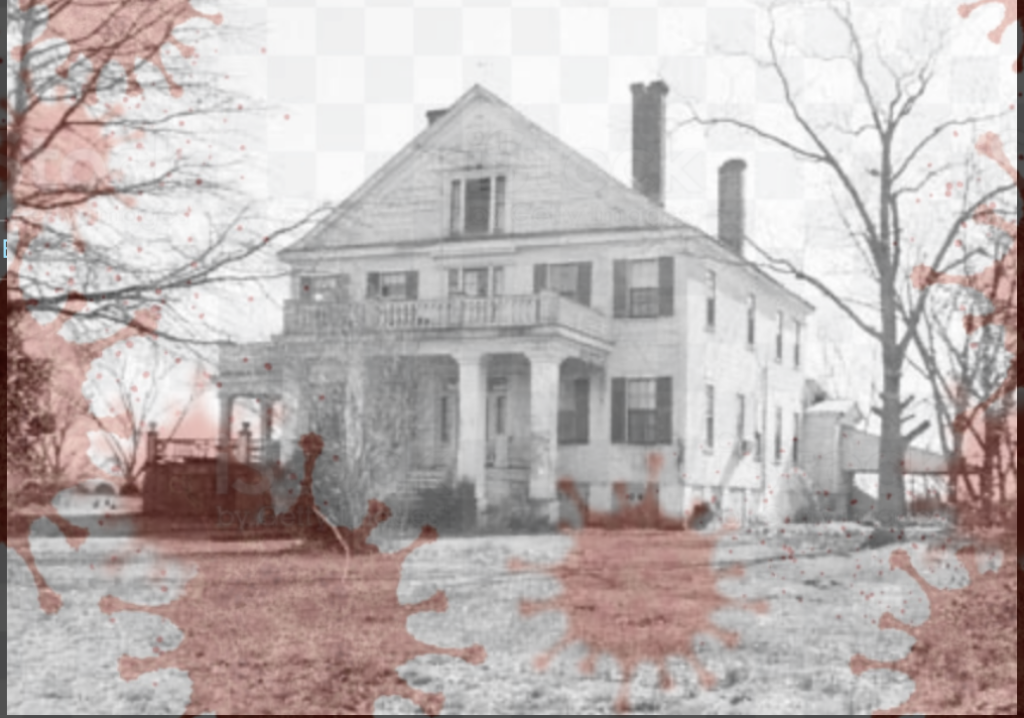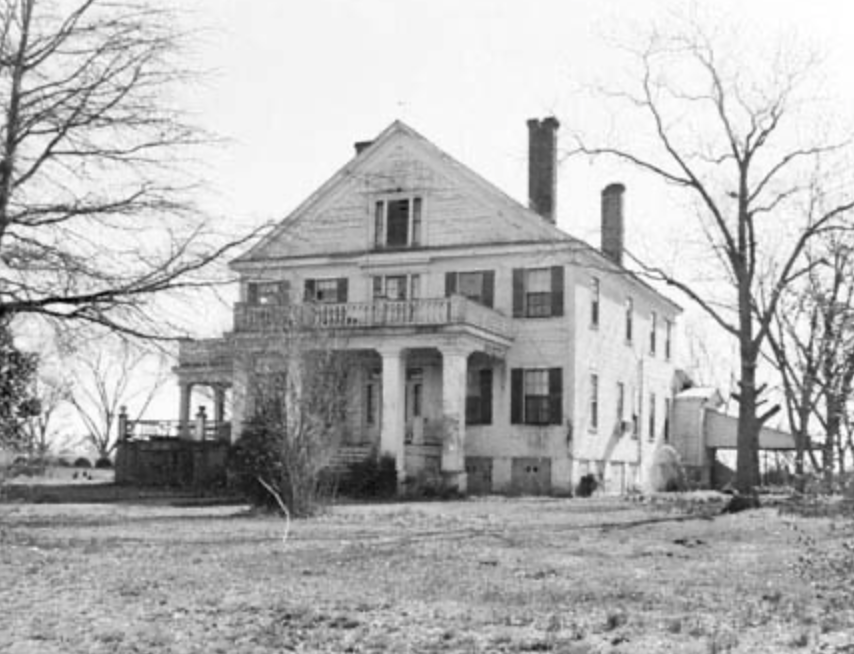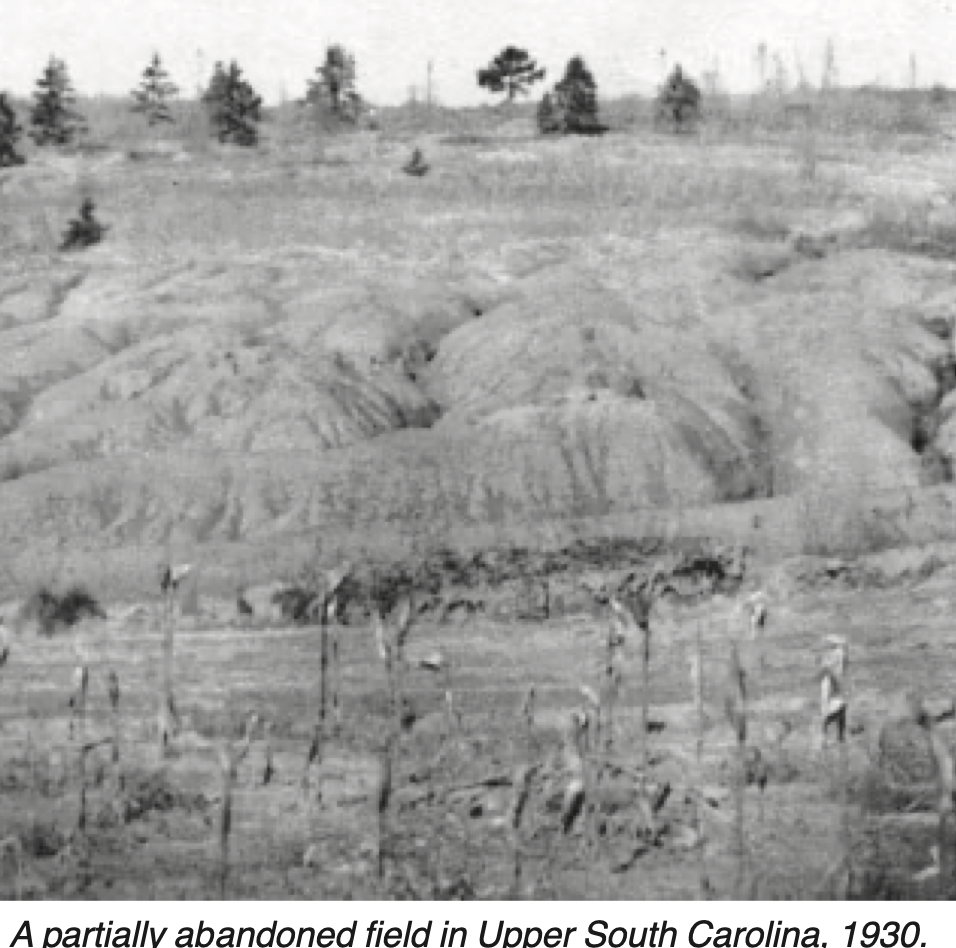
“Wastage of soil…a menace to the national welfare”
My great grandfather lived in this house called Gravel Hill. He bought this failed plantation about 1890. It never really thrived, limping along as they took in boarders and sold off land till the ’70s. They grew cotton that pulls tons of minerals from the soil. After years of cotton growing, even if you fertilize or manure, you run out of minerals. The soil is ruined. They just cut down trees, cleared land, planted more in a different place. And left old field to go fallow, to “heal.” In the mid-1920s, the cotton market crashed, most of our state’s land was so abandoned, depleted, worthless that we had extreme poverty, malnutrition and mass migration.

In my childhood, my great-grandmother, some aunts lived in the deteriorating house — it was an adventure to visit. The land was in no better shape. way over half of the agricultural land in South Carolina was declared ruined. Unfarmable. That emergency and other similar problems like the dust bowl led to the creation of the Soil Conservation Service in the 1930s, an organization that shaped the land we know today, saved it, and shaped our fore-father’s views of the land.
My father grew up in a giant, endless adventure of childhood on one of these failed farms. He had a friend and a mule to roam the swamps and fields. He watched as the newly formed Soil Conservation Service taught farmers about contours, cover crops, and erosion control. He knew about planting trees and beans and things that healed the land. Ove the course of his life, he became a steward, a caretaker a conservationist. Today, he’d be called a tree-hugger but he’d reject that word with a whole-body shudder.
Cotton farmers were a private industry, here to use the land and move on. That’s what industry does.
The idea some politicians still promote, that industry will work for the good of the land or the people or anything other than getting their dollars is about as real as the hope that a heavy feeding plant like cotton might just decide it doesn’t need so much nitrogen today. “Why, today, I’ll just let the soil rest and let that jimson weed have a taste.”
It took a national team of scientists, a coordinated effort of programs to save the land. Scientific inquiry and industrial inquiry are two different things entirely.
Clemson University’s, Dr. Ogle, who developed ‘Cherokee’ sweet potato and some of the black-eyed pea’s we eat today told me about a related nationally coordinated program. In Deep Rooted Wisdom, Dr. Ogle explained to me how Federally funded seed breeding brought nutritious crops to these failed farms. But he railed against the change that moved seed breeding from public service to private profit. It reduced your choice of quality vegetable seeds. In the late 60s, Coker Seed of South Carolina led the national legislation to put seed breeding in the hands of private companies.
Dr. Ogle said, “This was a mistake. It really hurt our public seed breeding, and things have been downhill ever since.” He believed this change could ultimately lead to poor nutrition and possible famine.
We’re facing huge environmental, social, and personal challenges today. We’re in a soil erosion emergency today. Literally, we don’t take care of our soil. It’s not hard to follow the logic, if the soil is poor, the food is poor, our bodies decline. We need to shape a new generation of leaders — just as the military, the scientist, the government shaped all those guys of the World War II generation, our fathers and mothers.
Sometimes, people say they pulled themselves up by their bootstraps, created this new world. No doubt they worked. But they were led by massive government-initiated social, engineering, agricultural programs administered by scientists. We have diverse agriculture, more equity, forest, food and love of lovely old houses and small towns today because of that leadership
Did they do everything right? Hell no. In hindsight, we see the problems but their goals included stewardship as well as developing new crops, steering agriculture and thereby stimulating the economy.
My parents, their peers grew up on the land, they loved it, they looked at the past mistakes of private industry and they supported responsible science to help us move forward.
Lots of them are doing so today; at home, waiting, supporting the science that will help us move on. But some of them are not. One literally chased Tom and me the other day, threatening to blow the ‘fake old virus’ onto us. Truth. Sad. We could have outrun him or just run around till he had a heart attack. We were civil during the entire encounter. We left infuriated. But more than that we left sad. I bet this man lived his life for his country. I bet he was in the military. He might even know the history of agriculture and the land and the realities of being hungry. Maybe not the details, but he lived through the remaking of this new model of government and industry, the kind of initiative that turned us that ruined soil into the breadbasket of the world. I want to have compassion. But really, he and his ilk, running around to restaurants and holiday parties are “a menace to the national welfare.” We need you to get over whatever is making you so mad. This country needs you. Let me use some words that you all used on me a thousand times. Quit playing the fool. Straighten up and fly right.
*Note the last paragraph was added to this essay Dec. 2020.
(quote at the title is from 1935 Congres’ Public Law 74-46, passed in 1935 confirming commitment to the conservation of the soil.)

Jenks, so sad and so true. I have one acre in suburbia. I work my one acre with the goal of soil replenishment. That, and continuing to speak out, write articles, and volunteer through my local Master Gardeners organization, is the best I can do. Thank you for your more valiant efforts. Fight on!
Thanks for more history of the area. It gives me so much more understanding of the intertwining of the condition of the land and the culture of the area.
We are such short-sighted people. Thanks. History to base decisions on is helpful and enlightening. …”we don’t take care of our soil.” Amen to that. There is much we don’t take care of.
Yes we are — I often remind people that kudzu saved us from all that. Now we don’t like kudzu any more…
Very interesting. Yes we have to feed the soil. That’s why have been gardening organically for 45 years. If the soil is healthy the plants grown there will be healthy also and fight disease.
That’s what we find. We still get bugs of course, but we have almost no soil bourn disease…